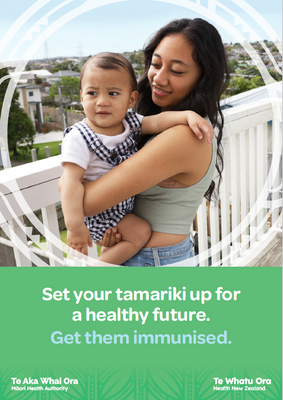Set your tamariki up for a healthy future - HP8686

Information about childhood immunisations.
Printed copies can be ordered from the National Immunisation Programme Bluestar portal https://portal.bluestar.co.nz/login/moh_vaccine
The full resource:
Set your tamariki up for a healthy future
Get them immunised
All immunisations on the National Immunisation Schedule are FREE for children under 18.
It doesn't matter what their visa or citizenship status is. This includes visitors to Aotearoa New Zealand.
Immunising your tamariki
Immunisation saves lives. Getting your tamariki immunised is one of the best ways to protect them and set them up for a healthy future.
Immunisation teaches your child's body how to fight off infectious diseases and reduces the risk of potentially life-threatening illness.
Immunising your child also protects other vulnerable people in your whānau and community who might not be able to get vaccinated themselves.
When to immunise
Your child's immunisation journey starts before birth. When you're pregnant, it's free to get vaccinated against diseases that could harm you and your pēpi (baby).
Once your baby is born, they can get regular immunisations against a range of preventable diseases, including whooping cough, chickenpox and measles.
These immunisations are given at specific times throughout your child's life to provide them with the best possible protection. Recommended vaccines for all tamariki and timings are on the National Immunisation Schedule. This is like a timetable that shows when each vaccine is due.
You can create a personalised immunisation schedule for your tamariki that shows what immunisations they need from 6 weeks to 13 years, and when they're due.
For the best protection, your tamariki needs all their immunisations
It's important your child has all their immunisations, at the recommended times. Not getting them immunised on time will put your tamariki at greater risk of getting a serious disease.
If you're not sure if your tamariki has been immunised, is overdue, or eligible, talk to their doctor, nurse or healthcare provider. You can also check their Well Child Tamariki Ora Health Book.
If your child has missed an immunisation, it's OK. Tamariki can catch up on most vaccinations.
Possible side effects and reactions
As a parent or caregiver, you may feel anxious about how your child will react to the immunisation and the potential side effects. It's common to feel this way. But don't worry, side effects are usually very mild, don't last long, and not all tamariki experience them.
The most common reaction to an immunisation is a slight fever or pain or swelling where the injection has been given.
All vaccines available in New Zealand have been thoroughly assessed for safety and effectiveness.
Where to get your tamariki immunised
To book an immunisation appointment, contact your child's doctor, nurse, or healthcare provider. Some immunisations are also available through pharmacies,
school programmes, Māori and Pacific health providers, and vaccination events. Flu and COVID-19 vaccines can be booked online at BookMyVaccine.nz
Additional vaccines
Some extra vaccines that aren't currently on the schedule may be recommended if your child is considered 'high-risk' or you're travelling overseas.
Ask your doctor, nurse, or healthcare provider what additional immunisations your tamariki may need.
Immunisations and recommended times
The National Immunisation Schedule outlines the free vaccines offered to tamariki at certain times in their life.
These are the immunisations recommended for your tamariki from 6 weeks to 13 years. You can create a personalised immunisation schedule for your tamariki at immunise.health.nz/schedule
6-week immunisations
- Rotavirus (dose 1 of 2)
- Diphtheria, tetanus, whooping cough, polio, hep B, and Hib (dose 1 of 3)
- Pneumococcal (dose 1 of 3)
3-month immunisations
- Rotavirus (dose 2 of 2)
- Diphtheria, tetanus, whooping cough, polio, hep B, and Hib (dose 2 of 3)
- Meningococcal B (dose 1 of 3)
5-month immunisations
- Diphtheria, tetanus, whooping cough, polio, hep B, and Hib (dose 3 of 3)
- Pneumococcal (dose 2 of 3)
- Meningococcal B (dose 2 of 3)
12-month immunisations
- Measles, mumps, and rubella (dose 1 of 2)
- Pneumococcal (dose 3 of 3)
- Meningococcal B (dose 3 of 3)
15-month immunisations
- Hib (booster)
- Measles, mumps, and rubella (dose 2 of 2)
- Chicken pox (single dose)
4-year immunisations
- Diphtheria, tetanus, whooping cough, and polio (booster)
5-year immunisations
- Eligible for COVID-19 vaccinations (2 doses, 8 weeks apart)
From age 9
- HPV (2 doses, 6 months apart)
From age 11
- Tetanus, diphtheria, whooping cough (booster)

Immunisation at a glance
- Immunisation protects tamariki from over 15 serious preventable diseases.
- Your child's immunisations start before birth. When you're pregnant, it's free to get vaccinated against diseases that could harm you and your pēpi (baby).
- Immunisations on the National Immunisation Schedule are free for all tamariki under 18 years old.
- For the best possible protection, your tamariki should have their immunisations when they're due, but if they've missed, it's ok, they can catch up.
- Some babies and children, who are at higher risk of disease, may be offered additional immunisations.
For more information about protecting your tamariki through immunisation
- talk to your doctor, nurse or healthcare provider
- call Healthline on 0800 611 116
- visit immunise.health.nz